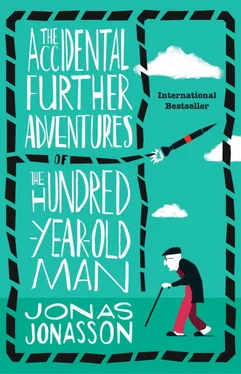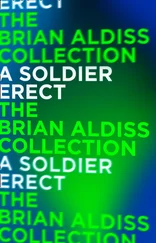‘Oh, but it is,’ said Julius. ‘The final journey is, of course, its own sort of travel – perhaps the most important one of all. Don’t you agree?’
The fair organizer, who earlier that day had received an application from a Slovenian manufacturer of shoehorns, realized that nothing could surprise him any more. ‘Of course, sir. I’ll send over the documents. We look forward to giving you and your… coffins a warm welcome.’
Now it was time to prioritize. They would have to take a number of samples. Which theme would be best from an international perspective?
Sabine wondered what Germans in particular might get excited about. A ‘Say No to Nuclear Power’ coffin?
Allan had been listening with one ear. Now he interfered to say that this wouldn’t work. Not in Germany, and not anywhere else. The Germans had already decided to do away with nuclear power, so what would be the point of protesting against it? To everyone else, the nuclear accident in Fukushima was already old news. People preferred to worry about things to come, as opposed to what had been or, in this case, was utterly ongoing.
Perhaps, however, they would be able to market an anti-nuclear-weapons coffin in Japan. There, the half-life of what people remember is not quite as short. After all, the level of radioactivity in ocean fish off the coast of Fukushima was still two thousand times the allowable limit. And recently levels of more than five hundred Sieverts per hour had been measured in the destroyed reactor.
‘So what does that mean?’ asked Julius, who didn’t really want to know: he had already dropped the anti-nuclear power coffin idea.
‘If the level had instead been three, it would have been survivable,’ said Allan.
‘Three hundred?’
‘No, three.’
Sabine muttered that this sounded cheerful. Was there anything in Allan’s black tablet that could benefit their business instead?
‘Maybe,’ said Allan.
What the tablet offered was, essentially, news from every corner of the world, a little bit of music and some naked ladies. For his own part, he focused on the first. ‘The prevailing sentiment right now is that those of us who have it good want to avoid dealing with those who have it bad.’
‘And what does that business model look like?’
Allan wasn’t sure, but any number of people were drowning in the Mediterranean each day, and when they floated ashore here and there, they would certainly need a coffin.
Sabine said that even living refugees probably weren’t their primary target group. Drowned ones, even less so.
Allan tended to agree.
Julius was impressed by the words Sabine was tossing around. ‘Business model’ and ‘primary target group’ within the span of a few sentences. ‘I think you have a nose for business,’ he said.
‘A nose for bad business,’ Sabine corrected him.
‘Do you have any experience with trade fairs?’ Julius wondered.
‘Yes, as a matter of fact.’
Once, twenty years earlier, her mother had taken her on a trip to Las Vegas. There, they had attended a ‘spiritual insight’ fair, which, loosely translated, involved a giant meeting between her mother and twenty-five thousand like-minded people from all over the world.
The main attraction for her mother had been the presentation on ‘Healing with Spiritual Energy’ but she’d managed to miss it – and just about everything else – because she had immediately discovered that LSD was sold in all imaginable forms in the neighbourhood. The Americans called it ‘acid’, and Sabine’s mother had explained to her daughter that she had no choice but to try out all the American varieties to see what sort of new spiritual insights she could find.
What happened next was that her mum stayed in their hotel room for three of the four fair days in a series of attempts to teleport herself and Sabine back to Sweden. She’d managed to get there time and again, she’d said, but her daughter, ever the rigid thinker, kept being left behind in Vegas.
Julius thought he was almost on his way to falling in love. ‘Poor wonderful you,’ he said. ‘The things you’ve had to deal with!’
‘Oh,’ said Sabine, blushing.
LSD trips over there hadn’t been much different from those at home. While her mother – or at least her spirit – was travelling back and forth across the Atlantic, Sabine had walked around the booths at the fair, learning the basics of how to communicate with your own guardian angel. She was offered an entire starter package for 2800 American dollars, including a DVD, a handbook and a CD containing ninety minutes of silence.
Angel Talk , the CD was called. The cover explained that it was empty because angels, in general, don’t talk.
The involuntarily retired asparagus farmer was reminded that the world was full of endless business ideas.
‘If our coffin project fails, maybe we can breathe new life into your mother’s operation,’ he said.
‘Maybe,’ said Sabine.
Gennady Aksakov grew up in 1950s Leningrad. His father taught philosophy; his mother worked at a bank. His loving parents doted on their only child. On his tenth birthday, Gena received a hockey stick and a new pair of ice skates, but ice hockey wasn’t for him. It felt too collective. The same went for football.
Instead he became enamoured of the combat sport of sambo, self-defence without weapons. It was man to man, with no one but yourself to depend on. It was a much better match for Gena’s temperament. What’s more, he met Volodya at the gym. They were the same age, an even match on the mats, they laughed at the same things and had a similar outlook on life. In short, they became best friends and still were, fifty-five years later.
Gena came and went as he pleased at Volodya’s workplace. He was the only one who was spared the extensive security routine at every entrance. The fact was, he didn’t even knock before stepping into his friend’s private office. Such as on this day.
‘Hi, Volodya,’ he said. ‘I just spoke with our friend from Chabarovsk. An ambitious young man, I must say. Who has, unfortunately, begun to sound a lot like the little big man in Pyongyang.’
‘How so?’ asked President Putin.
‘He wants that centrifuge. He says he needs it to make the Americans and Chinese start gasping in chorus.’
Putin smiled at the picture his friend had painted. A gasping Chinese and an equally gasping American, side by side. Lovely.
The ‘friend from Chabarovsk’ was the new director of the plutonium factory north of the North Korean capital. It so happened, of course, that the man formerly responsible for the operation had been put to death after failing at his task, and had been replaced by the man who, to those around him, had never been called anything but ‘Mr Engineer’. After the engineer in question had hanged himself from an extension cord in the cold storage room of the laboratory, the position had stood vacant for a few weeks before Kim Jong-un managed to get Putin in Moscow to have mercy on the Koreans and their situation. At least, that was how the Supreme Leader wanted to see it, that the Russian apostates of the True Way still had a little bit of Communist spirit left.
The truth was that Putin and his secret right-hand man, Gennady Aksakov, had no other agenda than to destabilize certain parts of the world, with a view to indirectly strengthening Russia. Then, as now, Volodya and Gena had not been about to send any plutonium centrifuge to the nut in Pyongyang. Instead they offered a highly qualified Siberian engineer. From Chabarovsk, not too far from the border between North Korea and Russia.
The man from Chabarovsk had a rough start, but soon turned out to be the asset the Russian president knew he was. Just a few weeks after stepping in, he had found success in his first underground detonation. This, of course, provoked an unholy fuss from the hypocrites in the rest of the world, all according to plan. Part of Putin’s agreement with the Supreme Leader was that Putin himself, and Russia, would sound as upset as everyone else.
Читать дальше
Конец ознакомительного отрывка
Купить книгу












